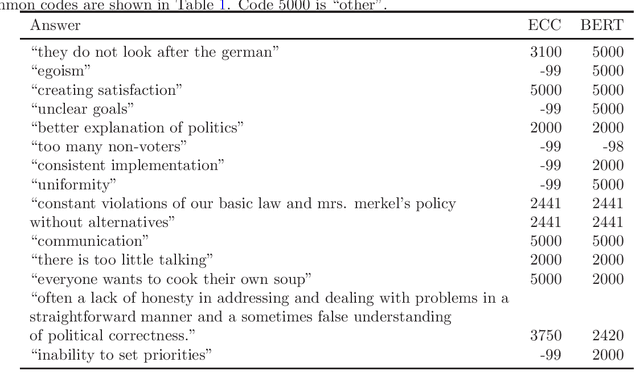Multi-label classification of open-ended questions with BERT
Paper and Code
Apr 06, 2023



Open-ended questions in surveys are valuable because they do not constrain the respondent's answer, thereby avoiding biases. However, answers to open-ended questions are text data which are harder to analyze. Traditionally, answers were manually classified as specified in the coding manual. Most of the effort to automate coding has gone into the easier problem of single label prediction, where answers are classified into a single code. However, open-ends that require multi-label classification, i.e., that are assigned multiple codes, occur frequently. This paper focuses on multi-label classification of text answers to open-ended survey questions in social science surveys. We evaluate the performance of the transformer-based architecture BERT for the German language in comparison to traditional multi-label algorithms (Binary Relevance, Label Powerset, ECC) in a German social science survey, the GLES Panel (N=17,584, 55 labels). We find that classification with BERT (forcing at least one label) has the smallest 0/1 loss (13.1%) among methods considered (18.9%-21.6%). As expected, it is much easier to correctly predict answer texts that correspond to a single label (7.1% loss) than those that correspond to multiple labels ($\sim$50% loss). Because BERT predicts zero labels for only 1.5% of the answers, forcing at least one label, while recommended, ultimately does not lower the 0/1 loss by much. Our work has important implications for social scientists: 1) We have shown multi-label classification with BERT works in the German language for open-ends. 2) For mildly multi-label classification tasks, the loss now appears small enough to allow for fully automatic classification (as compared to semi-automatic approaches). 3) Multi-label classification with BERT requires only a single model. The leading competitor, ECC, iterates through individual single label predictions.
 Add to Chrome
Add to Chrome Add to Firefox
Add to Firefox Add to Edge
Add to Edge